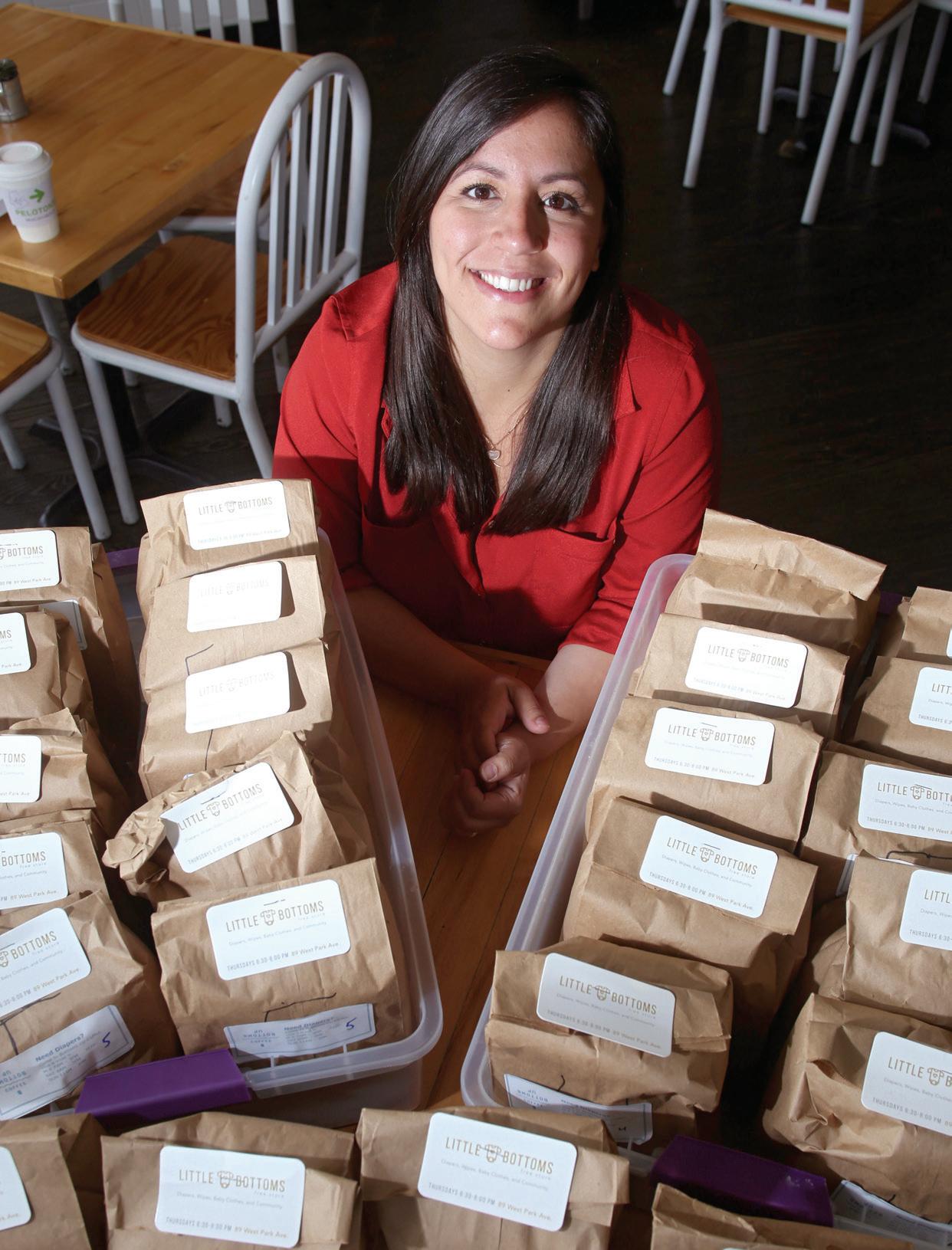
10 minute read
Virginia Nunes Gutierrez
A n on profit lea der prov es tha t kin dn ess can bring chang e.
By Ala n Froma n ThisWeek Community News
When Virginia Nunes Gutierrez and her sister, Victoria Calderon, opened Bottoms Up Coffee Co-Op in 2016 in Franklinton, their plan was to serve more than just coffee. “We wanted to serve the community and help drive economic development in Franklinton and improve the quality of life in the neighborhood,” Gutierrez said.
With that in mind, the sisters decided Bottoms Up would support organizations that worked to improve infant mortality rates. “We put out one cup where people could donate their change and dollars to buy diapers for mothers in Franklinton,” Gutierrez said. “And people really responded.”
In the past 2.5 years, Bottoms Up has donated more than 15,000 diapers to needy families in Franklinton and the surrounding community, she said. “You may not be able to change the world by yourself, but you have the power to impact the life of one person just by simple acts of kindness and empathy,” Gutierrez said.
Gutierrez, 32, said she learned from personal experience how small acts of kindness can make a difference. A native of Venezuela, Gutierrez’s family immigrated to Pennsylvania when she was 2 but returned to Venezuela when she was 12.
“We had to leave before we were deported,” she said of the return trip. “I didn’t know I had lived here all those years undocumented.”
In Venezuela, her parents divorced, and her family faced difficulties in a country coping with political and economic turmoil. “There weren’t homeless shelters or food pantries in Venezuela,” she said. “We got by because of the sacrifices my mother made and because of the assistance we received from family members and people we hardly knew.”
Gutierrez and her family earned legal status to return to the United States, and she came to Columbus in 2011, becoming a program officer and community health worker for the Ohio Hispanic Coalition and
Photo by Lorrie Cecil ThisWeek Community News
community health coordinator for the Mount Carmel Health System. Gutierrez later became an instructor in the Community Health Worker Training Program at the Ohio State University College of Nursing.
In 2017, she co-founded Avanza Together and serves as executive director for the nonprofit, which assists immigrant families in Central Ohio who are at risk for deportation. “Our mission is to link them to the resources and information they need and to help ensure that families can stay together,” Gutierrez said.
That mission involves raising funds to pay attorney fees, providing transportation to immigration hearings in Cleveland and helping families digitize their documentation. The community projects she has done through Bottoms Up and Avanza Together have been aided by “so many angels,” she said.
When Gutierrez and her sister sold Bottoms Up in 2018 to Joshua and Meghan Boone, the couple not only agreed to continue the diaper drive, but expanded the effort.
In 2019, the coffee shop partnered with the Little Bottom Free Store, a ministry of Central City United Methodist Church, as the store’s diaper supplier. The free store, open Thursdays and Saturdays at West Park United Methodist Church, offers diapers, wipes and baby clothes. Bottoms Up also has selected the Columbus Diaper Bank as a recipient of its diapers.
The partnerships “help us reach even more people with our diaper project,” Joshua Boone said. He and his wife didn’t give a second thought about continuing the diaper drive, he said.
“The thing you notice about Virginia is that when she sees a problem, she takes the initiative to fight it deeply and passionately,” Boone said. “She’s not one to stand idly by. She is active.”
It’s not an accident that so many people have joined the projects Gutierrez has helped start, he said. “She’s such a good person and a real leader,” Boone said. “You can’t help but be inspired by her.” H
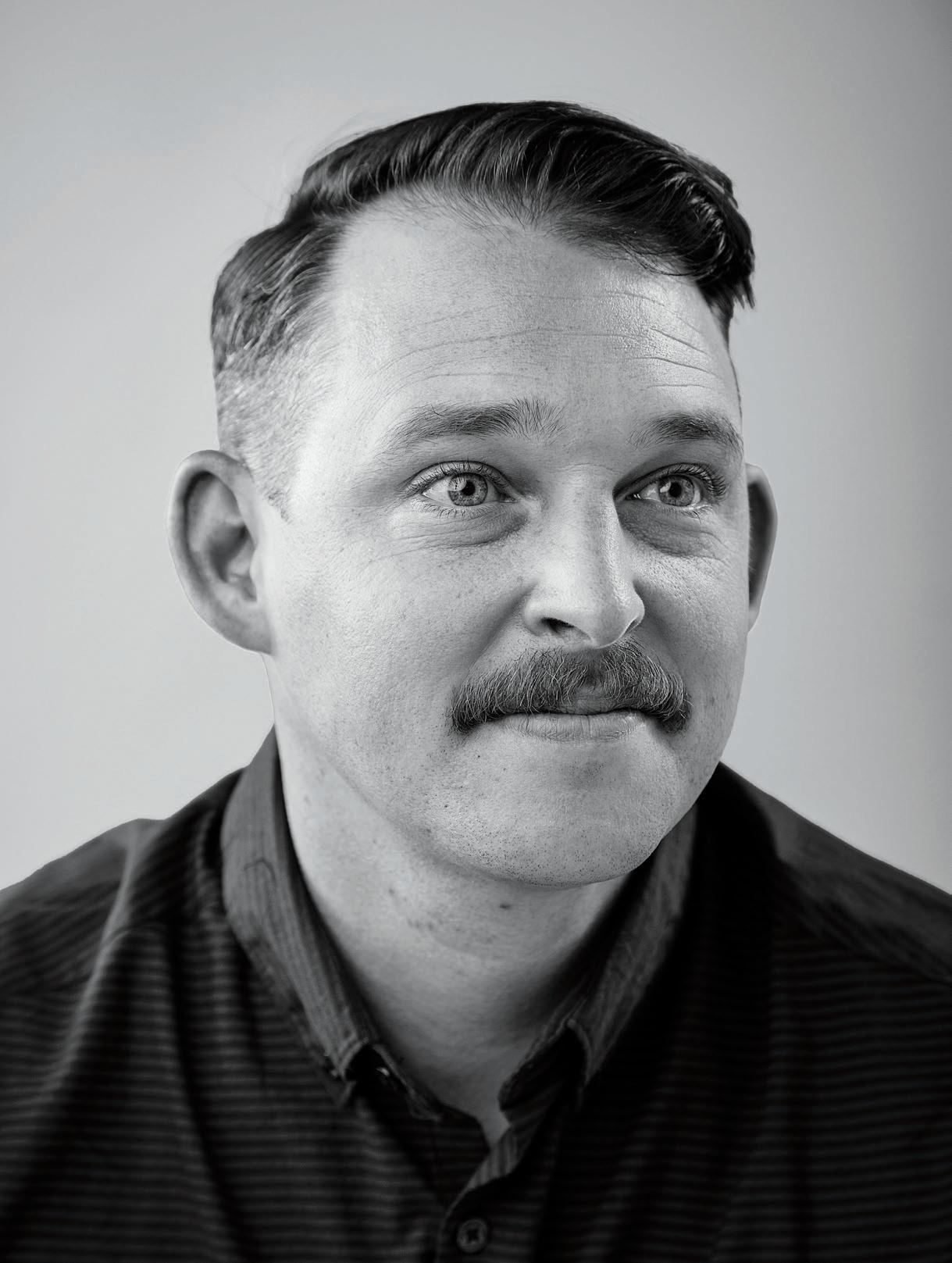
Austin Hill
A South Side resident sh ows compassion and love as h e h elps people addicted to drugs.
By Ken Gordon The columbus dispatch
Photos by Rob Hardin DI spatch MA gazines
For Austin Hill, the hardest part about working with people addicted to drugs is the realization that he can’t save them all.
Since 2017, Hill has been Columbus director of The Refuge, a faith-based ministry that provides a free, intensive, 13-month rehabilitation program. He oversees the final phases of the men’s program, which involves shepherding newly sober participants back to being productive members of society.
Not everyone makes it.
“Since I started, there’s rarely a month that goes by that I don’t know someone who dies; that’s just how it is,” Hill, 33, said recently from his office at Veritas West church on the Hilltop, which supports the ministry.
He deals with it “by crying a lot—I am not a ‘push it down’ person,” he said. But he also reminds himself of the many success stories.
“When I have exceptionally hard days, I go through those who have completed the program and who are doing really well,” Hill said. “Guys who have a healthy relationship with their kids, who have jobs, who are doing what they need to do.”
The Refuge was founded 20 years ago by Tom and Johnna Thompson. It began as a residential program on a Vinton County farm.
It has since grown into a four-phase program. For men, the first two phases still are on a farm, now in Lancaster. For the final two phases, which Hill oversees, the men live in an apartment building on the Hilltop.
There, recent alums of the program serve as coordinators, living with the approximately 40 participants. Hill affectionately calls it “a Christian commune.”
Hill has no background working with addicts and no formal training or college degree. What he has in abundance, though, is a seemingly bottomless well of compassion, according to those who work with him.
“What struck me with him was his deep care for people, and that’s what mattered to me,” said Wes Thompson, a son of The Refuge founders and pastor at Veritas West, who hired Hill two years ago. “He’s a very selfless person, and that’s ultimately what we wanted more than anything.”
Hill likes to say he was hired because he’s “the right kind of crazy,” his explanation for how a rural Union County kid ended up on the South Side, working with first the homeless and now with people addicted to drugs.
He grew up outside of Marysville in a strongly Christian home. Along with his parents, Mack and Tina, and two brothers, Hill went to church three days a week.
He graduated from Fairbanks High School in 2004, a year before his high school sweetheart, Chelsey. They were married in June 2005, and had their first of three daughters, Mabry, in 2006. She is now 13, and the couple have two other children, Charlie, 10, and Pepper, 7.
Hill had been attending Ohio State, but he left school to support his family, first as a maintenance man in an
apartment complex and then by owning a funnel-cake stand. Chelsey’s family was in the concession business.
In 2009, Hill’s father died suddenly of colon cancer at age 52. Hill said that loss led him to question how well he was living out his faith.
“I looked at my life, and there was nothing radically different for my kids to look at,” he said. “There was something about my parents, something about my dad that said that he actually cared for people the way Jesus says you’re supposed to.”
“So I looked at who Jesus hung out with and I was like, ‘He had fairly good judgment, so maybe I should hang out with them,’ ” he said.
In 2010, he began volunteering at Stowe Mission on the South Side and “fell in love with the place,” he said, becoming friends with many of the homeless.
He then started trying to convince his wife they should move to the neighborhood. “I was like, ‘I hope your new wife wants to do that,’ because that’s insane,” Chelsey said.
It took years, but the family eventually did move to the South Side in 2014, the same year Hill joined the staff at Stowe. “It’s hard to be married to somebody like me, I know it is, because I have a lot of passion and it gets me in trouble,” he said. “And if it wasn’t for my wife, we would be probably living in a cardboard box to contextualize with homeless families, so she is this voice of sanity.”
Chelsey, 32, calls her husband, “a uniquely passionate person. He’s definitely a giver.”
At The Refuge, Hill’s job is to work closely with the coordinators. They meet formally twice a week and talk constantly, discussing each participant’s progress.
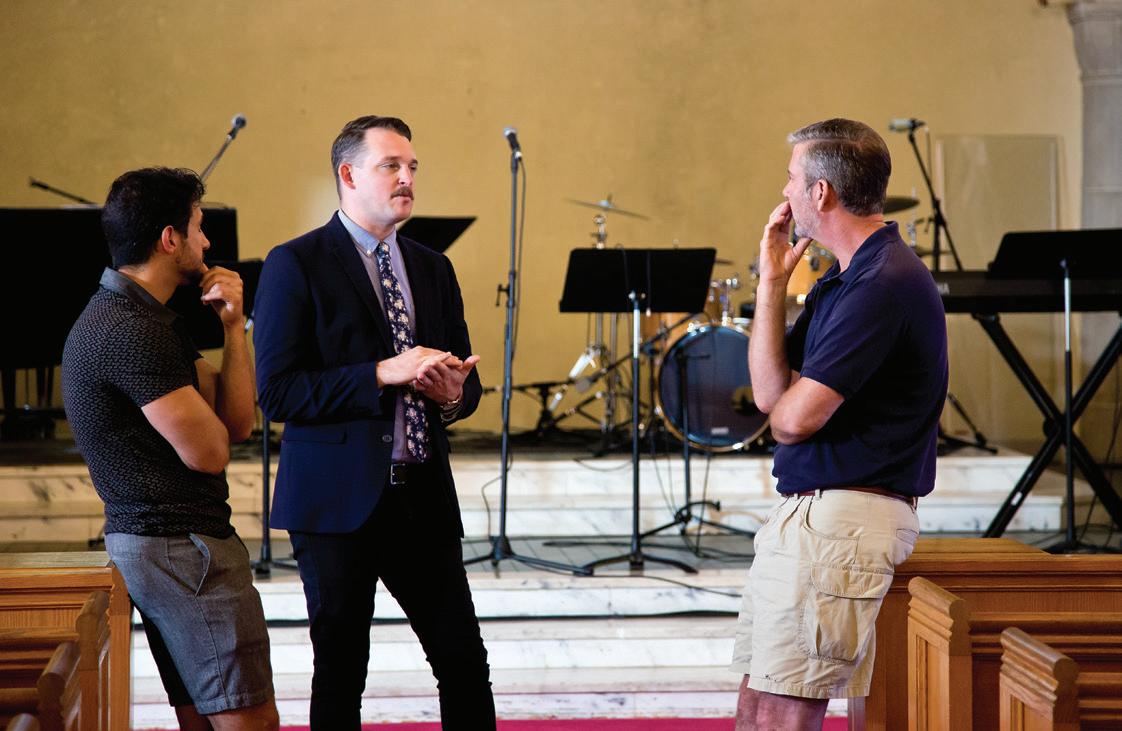
The coordinators, who all are in recovery, laud Hill for his deep compassion, a trait that resonates with a group of men who might otherwise not listen as closely to someone who has not walked in their shoes.
“It’s his ability to show a genuine desire to want to help; it’s obvious in the way he carries himself,” said Jordan Fillmore, a Refuge alum who now is the group’s administrative manager. “You know he’d do anything for you, and the guys notice that.”
Hill’s passion includes improving city neighborhoods. He believes strongly that The Refuge participants should serve in the Hilltop and Franklinton areas.
Under his direction, the men collectively have given nearly 3,000 hours of community service since 2017, from picking up trash to volunteering at events and area food pantries.
Mike Wells, director of the Lancaster phases of the Refuge, said he emulated Hill’s example and now has the men there doing community service as well.
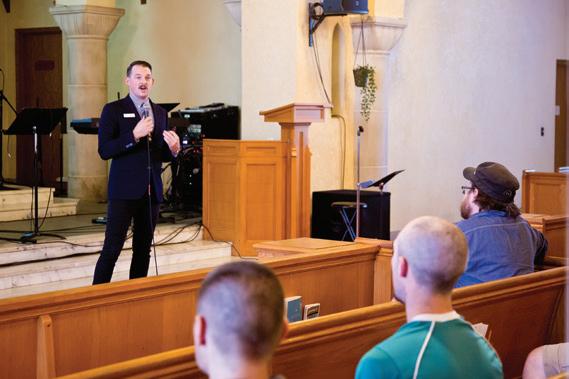
Left: Austin Hill speaks with The Refuge volunteers during an orientation at Veritas Community Church – West.
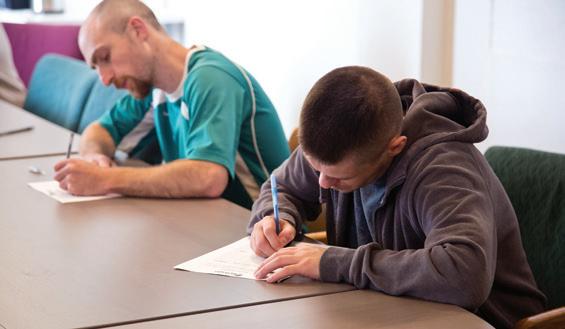
Top: Hill speaks to people interested in The Refuge.
Above: Men fill out applications for treatment at The Refuge.
“Before Austin, there was not much outreach at all,” Wells said. “With addiction, these men were breeding destruction and chaos, and they brought a lot of negative things to the community. But now what’s happening is, they are bringing positivity and serving others.”
Hill said his work can be exhausting emotionally, and also physically if he works too many hours. He is learning to draw clearer boundaries between his work and home lives.
If he ever needs inspiration, he can look to his right bicep, upon which he has tattooed a Bible verse that was meaningful to his father.
Micah 6:8 reads: “He has told you, O Man, what is good, and what does the Lord require of you but to do justice, love kindness and to walk humbly with your God.”
Working for justice and trying to show kindness, he said, makes it easier not to dismiss men who drop out of the program, but to focus on those who are succeeding and changing their lives for the better.
“We look at these giant, systemic problems like homelessness or addiction as a problem we’re never going to solve,” Hill said. “But if we invest our time and energy into one person and they’re radically changed, that means everything to them.” H

Austin hill
Neighborhood: South Side
Inspiration: He is inspired every time he is given the opportunity to come alongside individuals who were broken, and to be a part of their real-life transformation. But what is even more exciting is watching those now-restored individuals take part in restoring and rebuilding their families and communities.
An obstacle that he has overcome:
Realizing that the deep hurt and pain he continually sees in his neighborhoods is not something that will ever be conquered alone. Rather, it is an invitation to join in with the good work others have started before us that we must pass on to the next group of advocates and leaders.
What keeps him engaged: Striving to understand and constantly learn from and with the people who make up the communities he lives and works in.










